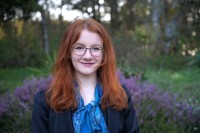From teenage activist to college student, hear former intern Cambria Keely’s journey into activism. Her contributions to Columbia Riverkeeper included rally speeches, letters to the editor, and more. We can’t wait to see what’s next for Cambria!
Reflections on Time with Columbia Riverkeeper

Golden rays fell upon the empty podium centered in the Kalama High School auditorium on a March afternoon, oddly warm for Washington State. The sun beams soon became interrupted by nearly one thousand participants bearing green or red shirts, flooding in to voice their opinion on the fracked-gas-to-methanol refinery proposed to be built on the banks of the Columbia River. It would be the world’s largest of its kind and would increase the state’s fossil fuel usage by one-third. Before full approval of the forty-year contract, it would have to pass through a rigorous permitting process subject to public comment, which is where I come in—a timid fourteen-year-old who was already watching my surrounding ecology crumble.
That day, the audience was mostly wearing green shirts to indicate their support for the project. Proponents touted job opportunities in a county still stricken with the aftermath of the 2008 economic recession. The proposing entity, Northwest Innovation Works (NWIW), visited the high school to offer students training in facility operations with a guaranteed job after completion. My voice trembled as I introduced concern about the five million gallons that NWIW requested to use daily from our aquifer, and the audience responded with laughter. But I wasn’t speaking to them—I was speaking to the regulatory board who held the fate of the Columbia River in their hands.
Following the hearing, my parents and I became heavily involved with a local activist group colloquially named NoMethanol360. As a teenager, I delivered rally speeches, worked as a graphic designer for local politicians, and met privately with the Department of Ecology. NoMethanol360 helped elect our mayor, Mike Reuter, who attempted to influence the Port and City Council’s permitting decisions. The group saw me begin college and eventually graduate with my high school diploma, two associate degrees, and two bachelors’ degrees. Five years after the beginning of my involvement, I landed a Community Organizer internship at Columbia Riverkeeper and that summer, NWIW dropped their proposal. Permit after permit were rejected by state agencies, resulting in the loss of investor funding. The climate win was unexpected and welcomed with open arms by the exhausted activist group. Even then, the most involved community members stuck together to apply their skills to other regional projects, like the Port Westward diesel refinery proposal.
My internship at Columbia Riverkeeper was a rigorous yet fulfilling job. The work environment was friendly and lenient, and my supervisor, Community Organizer Kate Murphy, put true effort into providing me with opportunities to explore varieties of work. From photography to conducting interviews to writing an op-ed with Senior Attorney Miles Johnson, my work plan was never boring. My favorite assignment was getting to organize the celebration for the end of the refinery fight; the Kalama activists had become family to me, and as they watched me blossom, I observed their capabilities flourish. I cried four times at the celebration picnic, unapologetically.
I worked for Columbia Riverkeeper for another year, shifting my area of interest into communications. Alongside other talented staffers, I was responsible for running social media, drafting strategies to share with partner organizations, and applying some of my organizing skillset to my pet project, the Hanford nuclear site. This summer, Yakama Nation welcomed Columbia Riverkeeper staff, including myself, to participate in Treaty Days and Hanford Journey. I had never been to the Hanford site before, and the experience was both humbling and eye-opening.
To the tribe’s Environmental Restoration and Waste Management crew, fighting for clean air and water isn’t optional. Despite being at zero fault for the Hanford pollution, Yakama Nation still bears the burden of holding Washington State leaders accountable for the site cleanup, a mighty task that heavily affects the tribe’s community and culture. At Hanford Journey, speakers came from all walks of life, including kiddos much younger than myself when I began fighting to protect the river. Tears were shed as tribal members danced and shared stories of canoeing and fishing on the Columbia. Attendees formed an unspoken bond that day through breaking bread and sharing the gorgeous sagebrush environment. Washington Department of Ecology Director Laura Watson delivered strong comments regarding the state’s obligation to the tribe and called on state and federal legislators to prioritize the Hanford cleanup before we lose more of our precious salmonid species.
From working under the guidance of Columbia Riverkeeper as a volunteer to providing volunteer support as a staff member, my time at the organization has been an educating and fun formative experience. At the end of the month, I’ll be moving on from Columbia Riverkeeper to pursue grant-writing, investigative research, and web design within the environmental organization network local to my new home, Bellingham. Nonetheless, Columbia Riverkeeper holds a special place in my heart, and I intend to become a legacy donor as well as remain friends with the wonderful staff members who helped save my hometown. And dear reader, I’d encourage you to do the same. Thank you for playing a part in saving our beautiful planet.
Learn more about Columbia Riverkeeper internship programs and sign up to receive Updates about Internship Opportunities.


